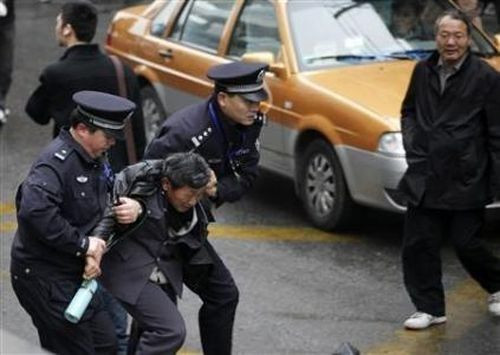China blames foreign media for police fracas

The Chinese government blamed foreign reporters on Tuesday for a weekend ruckus with police who tried to prevent them covering a planned protest in Beijing, as rights groups slammed China for curtailing press freedoms.
Lines of police checked passers-by and warned away foreign journalists in downtown Beijing and Shanghai on Sunday after a U.S.-based Chinese website spread calls for Chinese people to emulate the Jasmine Revolution sweeping the Middle East and assemble in support of democratic change.
An American news cameraman in Beijing was kicked and battered in the face with brooms and taken into police custody, witnesses said. Police detained and manhandled other reporters.
There was no obvious sign of any protesters, however.
Despite assurances that China is immune from the kind of unrest roiling the Middle East, China's ruling Communist Party has responded nervously, detaining scores of dissidents and tightening censorship of online discussions.
Foreign Ministry spokeswoman Jiang Yu told a regular news briefing there was no reason for so many reporters to cluster and block a busy part when nothing was happening.
It's a busy street with many people passing through it. There was nothing going on. So many reporters went there on receiving whose instructions? Who called them to congregate there and mill around? she said.
Reporters had ignored police instructions that they had to get permission before reporting on Beijing's Wangfujing shopping street, Jiang added. The street was mentioned in online messages as the place to gather and protest.
Foreign reporters in China must respect China's rules and laws. This is an international norm, she said.
OLYMPIC LAWS
According to rules issued just before the Beijing Olympics, China allows foreign reporters to interview anyone as long as they have their permission.
But the government often interprets the rules to suit its needs, especially when it comes to sensitive subjects. Tibet remains off limits apart from government-organised visits.
While foreign journalists are occasionally harassed or detained in China, local media have a far harder time and there has been no sign of the government relaxing its grip there. Chinese reporters can be fired or jailed for writing stories that stray too far from the government line.
The Committee to Protect Journalists said the concerted attack on foreign reporters in Beijing on Sunday represented a return to pre-Olympic conditions.
This is the worst aggression against the foreign press we've seen since the Olympics in 2008, Bob Dietz, the group's Asia programme coordinator, said in a statement on its website.
Such a heavy-handed response discredits the ruling Chinese Communist Party and highlights their fear of popular opposition.
Reporters Without Borders said there was no excuse for the thuggish attitude of police against the reporters.
The U.S. ambassador to China, who is considering a run for the White House, weighed in on Monday to condemn the harassment, as did the European Union.
Before the designated protest time last Sunday, police warned foreign journalists to stay away, apparently out of jitters about the protest call.
The government has now apparently put several areas of the capital off-limits to routine reporting.
Some journalists were told Wangfujing and several other areas in Beijing, including Xidan, Tiananmen, and Beijing Station, are considered 'special zones' and journalists who wish to report in these areas must apply in advance, the Foreign Correspondents Club of China said.
The Wangfujing Management and Construction Office told one journalist it takes three days to process official application letters, and journalists must promise to submit a copy of the finished story after it is released.
© Copyright Thomson Reuters 2024. All rights reserved.





















